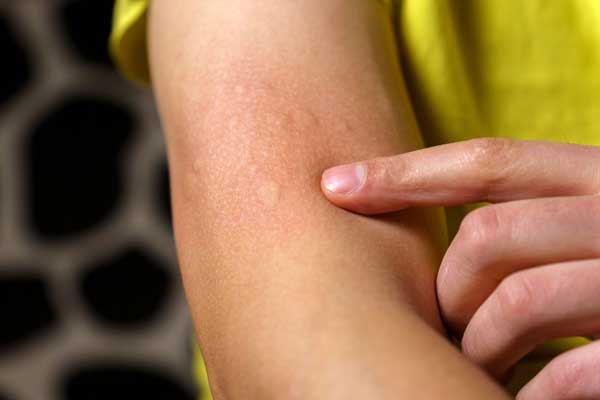Hives, also known as urticaria, are extremely itchy, irritating raised bumps that can occur on the skin. They are usually red and swollen, feel hot and look like mosquito bites. In this article, we will cover what exactly causes hives, the different treatment options available as well as red flags to watch out for regarding this condition.

What Are Hives (Urticaria)?
Hives or urticaria refers to sudden bumps on that skin that are warm, red and extremely itchy. They can appear as small, scattered bumps or in larger patches that cover big areas of skin. Hives are often associated with swelling of the eyes, lips, face or hands – a condition known as angioedema.
On a microscopic level, hives occur due to a massive release of histamine from immune cells in the skin. This leads to an enlargement of tiny blood vessels and fluid leaking out into the surrounding skin tissues, causing the irritating and itchy swellings.
Hives are very common, with about 20% of people experiencing at least one episode at some point in their lives. Hives that disappear within 6 weeks are called acute hives. Chronic hives last longer than 6 weeks at a time. This article focuses specifically on acute hives.
Causes of Acute Hives
There are several potential causes and triggers for acute hives:
- Viral Illnesses and Fevers – Viral infections often trigger hives in children and adults.
- Allergens – Allergic reactions to things like pollen, pet hair, dander, dust mites or latex can cause hives.
- Parasites – Scabies, lice or other parasites biting the skin provoke hives.
- Insect Bites – Mosquito, spider or ant bites often result in hives.
- Temperature Changes – Sudden exposures to heat or cold can also bring about hives.
- Sun Exposure – Ultraviolet rays stimulate histamine production.
- Medications – Antibiotics and NSAIDS are common prescription culprits.
- Food – Shellfish, nuts, eggs and berries are highly allergenic.
- Idiopathic – In about 50% of acute hive cases, no cause is identified.
The hives erupt suddenly, last less than 24 hours usually, then fade – only to reappear again in the same or different locations. This repetitive cycle continues for days or even weeks, accompanied by maddening itchiness.
Treatment Options for Hives
The good news is there are effective treatment options for taming acute hives available, including:
Antihistamines
Antihistamines such as diphenhydramine (Benadryl), chlorpheniramine, hydroxyzine, promethazine, loratadine (Claritin), fexofenadine (Allegra) and cetirizine (Zyrtec) block histamine response and reduce redness, swelling and itching.
Second Generation H1 Blockers
Sometimes combinations of different antihistamine classes like ranitidine and cimetidine may be prescribed.
Identify and Avoid Triggers
Pinpointing and preventing hive provoking allergens or infections can stop recurrences.
Have Medications Handy
Keep fast-acting antihistamines stocked since acute hives often strike repeatedly.
Seek Prompt Medical Care
Make sure to get evaluated rapidly if you experience any of the red flaghive symptoms below:
Red Flags to Watch Out For
See your doctor immediately if you notice:
- Individual hives lasting over 24 hours
- Hives leaving behind brownish skin discoloration
- Hives causing bleeding spots called petechiae
- Hives resolving but recurring in the same spots
These red flag symptoms can indicate vasculitis or other medical issues requiring further investigation via skin biopsy and blood tests. Fortunately though, most cases of acute hives remain benign.
The Bottom Line
In summary, hives or acute urticaria arises from the swift release of histamine in the skin, leading to irritating raised, red, itchy bumps appearing suddenly and lasting less than a day initially. However, new crops of hives then repeat this pattern for up to 6 weeks at a time.
Treatment relies predominantly on antihistamines to control swelling and itchiness, while identifying and avoiding triggers can prevent future outbreaks. Call your doctor promptly if hives exhibit any red flag warning signs. But rest assured, acute hives generally get better on their own with simple self-care measures.
